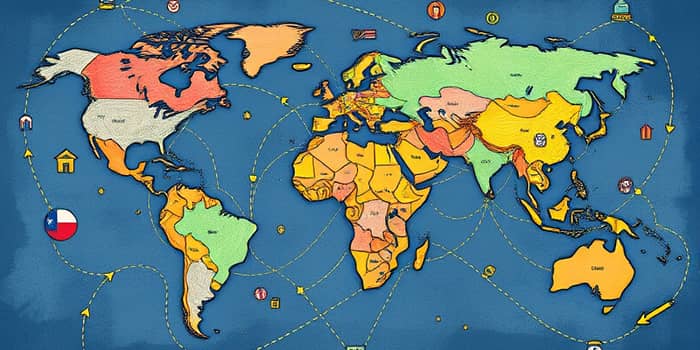
As geopolitical tensions escalate across continents, businesses are recalibrating their strategies, reallocating capital, and reshaping global footprints like never before.
In 2025, CEOs rank intensifying US-China trade wars as the foremost conflict-related threat to global growth. The rise of nationalism and political instability has disrupted age-old assumptions of unfettered cross-border cooperation.
These shifts manifest in multiple areas:
The world is fragmenting into disruption-prone multi-aligned trade and investment blocs, compelling firms to rethink legacy plans and assess geopolitical exposures more rigorously.
Geopolitical shocks—from sanctions and trade rows to outright military conflicts—have tangible effects on financial markets. On average, global equities fall by 1% per month in high-risk periods, with emerging markets suffering declines of up to 2.5–5%.
Sovereign credit insurance costs spike alongside equity drops. Advanced economies experience a 30 basis point rise in risk premiums, while emerging markets can see increases of up to 120 basis points after major geopolitical events.
To mitigate these risks, companies are adopting shorten, simplify, and regionalize supply chains. Friend-shoring initiatives reallocate operations to geopolitically aligned nations, fostering more predictable trade routes.
Risk teams now embrace holistic and proactive risk management, integrating geopolitical scenarios into core decision processes. Key measures include:
This integrated approach transforms intangible political threats into quantifiable risk factors within investment models.
Asset allocators are shifting toward thematic exposures in defense innovation, cyber capabilities, and critical infrastructure. Actively managed funds that emphasize macro differentiation are outperforming passive benchmarks in this volatile environment.
Technology firms illustrate this trend by relocating data centers from high-risk zones to stable allied regions. One global cloud provider reduced downtime risk by 40% after a strategic friend-shoring decision.
Energy companies are diversifying into renewables within politically stable markets to hedge against oil and gas supply shocks. Logistics and transportation providers build regional hubs connected by digital networks, ensuring delivery continuity despite border disruptions.
The protracted Russia-Ukraine conflict continues to drive European energy diversification programs. Companies are rerouting pipelines and investing in LNG terminals to reduce Russian gas dependence.
In the Middle East, regime shifts and expanding political jihadism amplify oil price volatility. Multinationals operating in this region now factor higher insurance premiums and security costs into capital budgets.
Meanwhile, the EU and US are intensifying economic statecraft through investment screening, export controls, and subsidies for semiconductors, clean energy, and defense sectors. These measures further fragment the global market.
Transform uncertainty into opportunity by embracing operational resilience and agility imperatives. Senior teams should:
Embedding these practices fosters an adaptive organization ready to pivot amid evolving political landscapes.
As deglobalization deepens, regional blocs will drive investment flows and technological standards. Companies that treat geopolitical risk as strategic asset can capitalize on emerging markets within aligned blocs, secure supply chains, and capture alpha from thematic sectors.
Leaders who integrate political foresight into strategy will not only safeguard assets but also shape a more stable, inclusive global economy. In this new paradigm, proactive adaptation and value-driven innovation become the ultimate competitive advantages.
References













